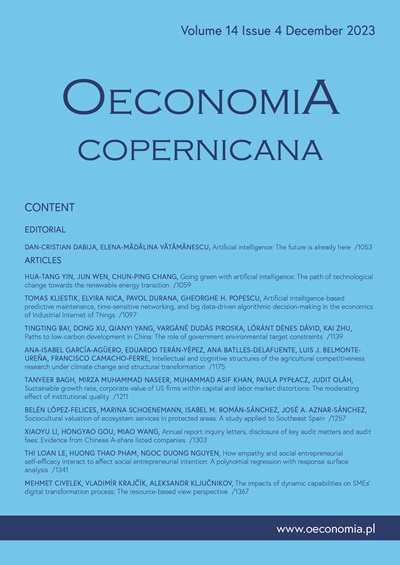大数据驱动认知制造中基于人工智能的决策算法、物联网传感网络和可持续信息物理管理系统
IF 10.8
1区 经济学
Q1 ECONOMICS
引用次数: 18
摘要
研究背景:随着越来越多的证据表明认知技术在制造企业的各个层面上逐渐整合,有一个工具需要理解认知制造系统如何在复杂的操作过程中提供更高的价值和精度。本文目的:通过对前人研究成果的积累,证明了认知制造集成了基于人工智能的决策算法、实时大数据分析、可持续产业价值创造和数字化批量生产。方法:在2022年4月和6月期间,采用系统评价和元分析首选报告项目(PRISMA)指南,对ProQuest、Scopus和Web of Science数据库进行了定量文献综述,搜索词包括认知工业物联网?认知自动化?认知制造系统?认知增强机器?认知技术驱动的自动化?认知计算技术;还有认知技术。我们利用了系统回顾数据存储库(SRDR),这是一个用于收集、处理和分析我们研究数据的软件程序。所选学术来源的质量通过利用混合方法评估工具(MMAT)进行评估。AMSTAR(评估系统评论的方法学质量)部署了人工智能和智能工作流,并使用Dedoose进行混合方法研究。VOSviewer布局算法和Dimensions文献计量图作为数据可视化工具。发现与增值:认知制造系统基于可持续的产品生命周期管理、基于物联网的实时生产物流、深度学习辅助的智能流程规划、优化的价值创造能力和基于人工智能的决策算法。接下来的兴趣应该集中在预测性维护如何通过使用基于人工智能的决策算法、实时大数据分析、可持续工业价值创造和数字化大规模生产来协助认知制造。本文章由计算机程序翻译,如有差异,请以英文原文为准。
Artificial intelligence-based decision-making algorithms, Internet of Things sensing networks, and sustainable cyber-physical management systems in big data-driven cognitive manufacturing
Research background: With increasing evidence of cognitive technologies progressively integrating themselves at all levels of the manufacturing enterprises, there is an instrumental need for comprehending how cognitive manufacturing systems can provide increased value and precision in complex operational processes.
Purpose of the article: In this research, prior findings were cumulated proving that cognitive manufacturing integrates artificial intelligence-based decision-making algorithms, real-time big data analytics, sustainable industrial value creation, and digitized mass production.
Methods: Throughout April and June 2022, by employing Preferred Reporting Items for Systematic Reviews and Meta-analysis (PRISMA) guidelines, a quantitative literature review of ProQuest, Scopus, and the Web of Science databases was performed, with search terms including ?cognitive Industrial Internet of Things?, ?cognitive automation?, ?cognitive manufacturing systems?, ?cognitively-enhanced machine?, ?cognitive technology-driven automation?, ?cognitive computing technologies,? and ?cognitive technologies.? The Systematic Review Data Repository (SRDR) was leveraged, a software program for the collecting, processing, and analysis of data for our research. The quality of the selected scholarly sources was evaluated by harnessing the Mixed Method Appraisal Tool (MMAT). AMSTAR (Assessing the Methodological Quality of Systematic Reviews) deployed artificial intelligence and intelligent workflows, and Dedoose was used for mixed methods research. VOSviewer layout algorithms and Dimensions bibliometric mapping served as data visualization tools.
Findings & value added: Cognitive manufacturing systems is developed on sustainable product lifecycle management, Internet of Things-based real-time production logistics, and deep learning-assisted smart process planning, optimizing value creation capabilities and artificial intelligence-based decision-making algorithms. Subsequent interest should be oriented to how predictive maintenance can assist in cognitive manufacturing by use of artificial intelligence-based decision-making algorithms, real-time big data analytics, sustainable industrial value creation, and digitized mass production.
求助全文
通过发布文献求助,成功后即可免费获取论文全文。
去求助
来源期刊

Oeconomia Copernicana
ECONOMICS-
CiteScore
13.70
自引率
5.90%
发文量
26
审稿时长
24 weeks
期刊介绍:
The Oeconomia Copernicana is an academic quarterly journal aimed at academicians, economic policymakers, and students studying finance, accounting, management, and economics. It publishes academic articles on contemporary issues in economics, finance, banking, accounting, and management from various research perspectives. The journal's mission is to publish advanced theoretical and empirical research that contributes to the development of these disciplines and has practical relevance. The journal encourages the use of various research methods, including falsification of conventional understanding, theory building through inductive or qualitative research, first empirical testing of theories, meta-analysis with theoretical implications, constructive replication, and a combination of qualitative, quantitative, field, laboratory, and meta-analytic approaches. While the journal prioritizes comprehensive manuscripts that include methodological-based theoretical and empirical research with implications for policymaking, it also welcomes submissions focused solely on theory or methodology.
 求助内容:
求助内容: 应助结果提醒方式:
应助结果提醒方式:


